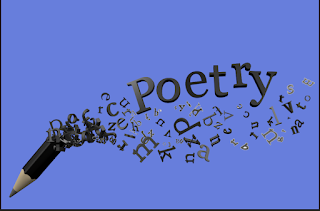Defining Poetry. Is poetry rhyming words arranged in a pattern? Young children often think so. If one word rhymes with the next, a child can construct a poem easily. Does poetry consist of emotions on paper? Free verse poets hold that no rhyme is necessary to portray one's deepest affections. Is poetry more a science than an art? William Wordsworth seemed to enjoy writing in sonnet form, since it forced him to develop his imagination within a particular pattern.*
Length & Style of Poetry. Sometimes, themes in poetry emerge in a shimmer. They dazzle, whereas prose might elongate those same notions. Poetry might tend to be short, but not all poems fit that description. Milton's Paradise Lost contains over 10,000 lines. Other epic poems rival that length. Students often learn that poetry is written in lines, whereas prose is not. That difference may be the easiest way to contrast prose and poetry. But prose can contain poetic elements. Who hasn't been riveted by a prose author's account, one that flowed from his pen almost as if in a series of brush strokes from a painter? One could argue that many literary elements--similes, metaphors, alliteration, etc., which frequently live in poetry--are themselves imaginative poetic devices wherever they are found, whether in prose or poems.
A Few Motivations for Writing Poetry. In his Defense of Poesy, Sir Philip Sidney wrote that poetry served to "teach and delight." Poesy, as defined by Sydney in this 16th century work, was not merely poetry but any imaginative work, including works of fiction. I am not specifically defining poetry as Sidney does. Yet, I agree: whatever the Christian studies ought to teach. Further, it should foster virtue. (See Philippians 4:8.) Delightful learning is also preferred. In the words of Proverbs 16:21b, "The sweetness of the lips increaseth learning." Edifying believers and glorifying God are likewise salient motivations for the believing writer of poetry.
Subjects of my Poetry. I don't claim to be an amazing poet. But I have found that poems sometimes glide from my pen (or under my fingers on a keyboard). As I view these poems on my computer, I note they were often generated after reading a memorable text of Scripture or hearing a particularly powerful sermon. Sometimes they resulted from observing a beautiful scene. Frequently they are encapsulated nuggets of truths I gleaned from considering some point made real to me.
 |
| Benjamin Keach (1640-1704) |
Benjamin Keach: A Baptist poet of the Past. Benjamin Keach authored multiple volumes from the 1660s to about 1700. His poetry is alive with biblical allusion. A contemporary of Bunyan, Keach wrote poetic dialogues for several of his allegories. Book-length poems, such as The Glorious Lover, came from his pen. Keach's own book publisher imagined these literary tomes would last until the end of time, but many today have never heard of Keach or his works.
Because one of Keach's primary motives was to edify believers, he penned not only allegory and a massive work on Biblical tropes, but also a significant number of hymns. For many of these hymns, one particular attribute or metaphor depicting God is in focus. Keach's own fascination with Biblical metaphors led him frequently to develop these in his poetic depictions of the Psalms or other Scripture passages. I personally find the poetry contained in hymns such as these to be poignant portrayals that help bring truth to mind in a way that is both memorable and imaginative.
This Series. In this series on poetry, I will share some of the poems I have written. I also plan to post poetry from believing authors of the past--individuals whose names have become more familiar to me as I have been working to research and produce unit studies on Baptist authors of literature.
* Ironically, Wordsworth contended against critics of the sonnet form with his own sonnet about the sonnet's acclaim:
Scorn not the Sonnet



Comments